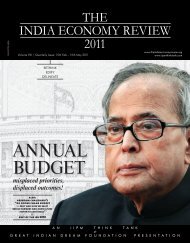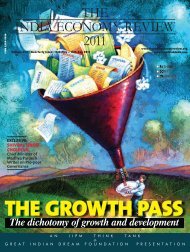Download - The India Economy Review
Download - The India Economy Review
Download - The India Economy Review
Create successful ePaper yourself
Turn your PDF publications into a flip-book with our unique Google optimized e-Paper software.
P LANNING P ARADIGM<br />
After the elections in 2008, the new<br />
Democratic Party in Penang announced it<br />
would do away with all reservations. Last<br />
year, the Prime Minister of the country<br />
announced several steps towards abolish-<br />
ing the reservation for the sons of the soil<br />
in the services sector. <strong>The</strong> equity quotas<br />
and the compulsory local shareholding for<br />
foreign companies too is on its way out.<br />
<strong>The</strong> purpose of ensuring ownership of<br />
equity for the local Malay achieved, it is<br />
time for investment to be freed up so for-<br />
eign funds could be attracted. In <strong>India</strong>,<br />
this seemed to have escaped the policy<br />
maker. <strong>The</strong> under privileged were given<br />
reservations and they occupied lowly jobs,<br />
never in ownership of wealth. Even in<br />
96 THE IIPM THINK TANK<br />
Malaysia, reservations must have bred<br />
ineffi ciency and nepotism, but in <strong>India</strong><br />
they did not even seem to have empow-<br />
ered the benefi ciary.<br />
Malaysia embarked on reforms early.<br />
By the early seventies, most ineffi cient<br />
public sector was privatised. While <strong>India</strong><br />
was going full steam ahead with a spree of<br />
nationalisation, Malaysia was inviting<br />
private domestic and foreign investment.<br />
Agriculture that was the main occupation<br />
in Malaysia, accounted for over 42 percent<br />
of the GDP in 1970 and ten years later was<br />
down to nine percent. Manufacturing<br />
rapidly grew and in 1980, more than 30<br />
percent of the GDP would come from<br />
industry and manufacturing. In contrast,<br />
<strong>India</strong>n manufacturing has contributed less<br />
than 25 percent to the economy for more<br />
than 40 years now and agriculture contin-<br />
ues to employ more than half the working<br />
population even today.<br />
As the demand for tin fell, rubber plan-<br />
tations grew. And then the country made<br />
a switch to palm oil. Today exports of palm<br />
oil contribute substantially to forex earnings.<br />
Forests were sources of much of the<br />
timber trade that Malaysia depended on<br />
in the fi rst half of the twentieth century.<br />
However, responsible forest policy has<br />
ensured that even now more than 50 percent<br />
of Malaysia is covered with forests.<br />
In <strong>India</strong>, the fi gure is an exaggerated 18<br />
percent today. Trade with Britain came





